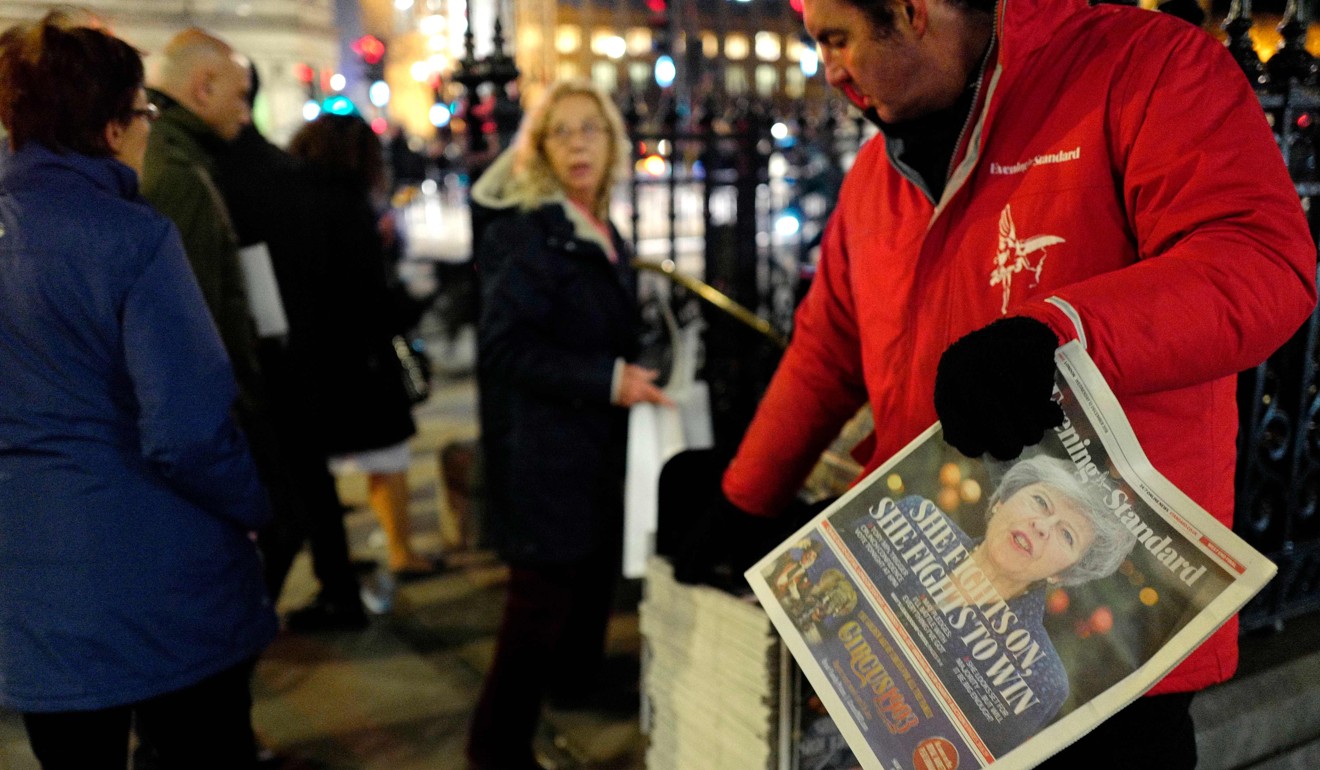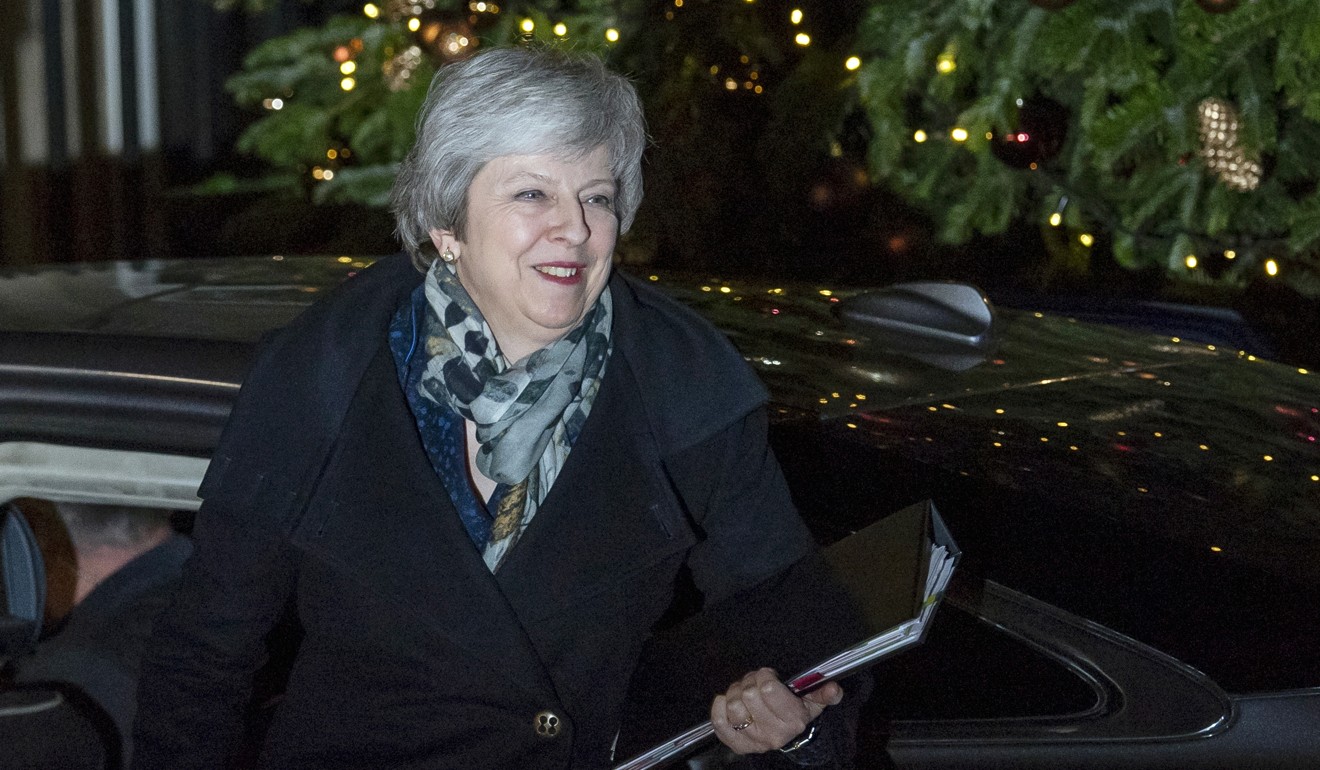
British PM Theresa May survives leadership vote and declares it her ‘renewed mission’ to deliver Brexit – but vows to resign by 2022
- Theresa May won the vote among fellow Conservatives by 200 to 117
- The challenge was triggered by Eurosceptic critics of her proposed Brexit deal, which currently has little chance of support in parliament
British Prime Minister Theresa May has survived a confidence vote from her Conservative party on Wednesday, but more than a third of her lawmakers said she was no longer the right leader to implement Britain’s exit from the European Union.
Britain’s March 29 exit has been plunged into crisis by parliamentary opposition to the divorce deal she struck with the EU last month, which has opened up possibilities including a delay to Brexit or even another referendum on membership.

Afterwards, May said she would get on with her “renewed mission” of taking Britain out of the European Union.
“Following this ballot, we now have to get on with the job of delivering Brexit for the British people and building a better future for this country,” May told reporters outside her Downing Street residence.
May said she would seek legal and political assurances from EU leaders on Thursday on the backstop arrangement over the border between EU member state Ireland and the British province of Northern Ireland.
May on Monday cancelled a parliamentary vote on her Brexit deal, designed to maintain close future ties with the bloc and agreed after two years of negotiations, after it became clear she would lose it badly.
Eurosceptic critics of the deal within her own party triggered the no-confidence vote in her leadership hours after she returned from talks with European leaders aimed at winning additional assurances about her deal.
After two hours of voting in Committee Room 14 in the House of Commons, Graham Brady, chairman of the 1922 Committee of Conservative backbenchers, announced at 9pm Wednesday that 200 Conservative lawmakers had voted in support of May as leader, and 117 against, indicating her party was bitterly divided over the direction of Brexit.
Supporters said the result showed the party should now get behind her. But the hardline Brexit supporters who triggered the vote because they saw her deal as a betrayal of the 2016 referendum said she should now quit.
“It is a terrible result for the prime minister,” Jacob Rees-Mogg, leader of a hard Brexit faction in the party, told BBC Television. “The prime minister must realise that, under all constitutional norms, she ought to go and see the queen urgently and resign.”
But May loyalist Chris Grayling, her transport minister, said the party had endorsed her “comfortably”.
May, who voted to remain in the EU in the 2016 referendum, had warned opponents of her withdrawal deal – struck after two years of negotiations – that if they toppled her, Brexit would be delayed or stopped.
Shortly before the vote, May sought to win over wavering lawmakers by promising to step down before the 2022 election.

Cabinet minister Amber Rudd confirmed May’s vow not to stand in 2022, as did MP Robert Buckland.
“She said ‘in my heart I would like to lead the party into the next election’ and then that was the introductory phrase to her indication that she would accept the fact that that would not happen, that is not her intention,” Buckland said.
Brexit is Britain’s most significant political and economic decision since second world war. Pro-Europeans fear the departure will weaken the West as it grapples with the US presidency of Donald Trump and growing assertiveness from Russia and China.
The outcome will shape Britain’s US$2.8 trillion economy, have far-reaching consequences for the unity of the kingdom and determine whether London keeps its place as one of the top two global financial centres.
Supporters of Brexit admit there may be some short-term pain for Britain’s US$2.9 trillion economy, but say it will prosper in the long term when cut free from the EU, which they cast as a failing German-dominated experiment in European integration.
May, 62, won the top job in the turmoil that followed the 2016 EU referendum, where Britons decided by 52 per cent to 48 to leave the EU. She promised to implement Brexit while keeping close ties to the bloc, to heal a divided nation.
Sterling jumped as high as US$1.2672 as the result came in but then fell to US$1.2605, still up 1 per cent on the day, after it emerged that the number of lawmakers who had voted against May was higher than many in the markets had expected.

